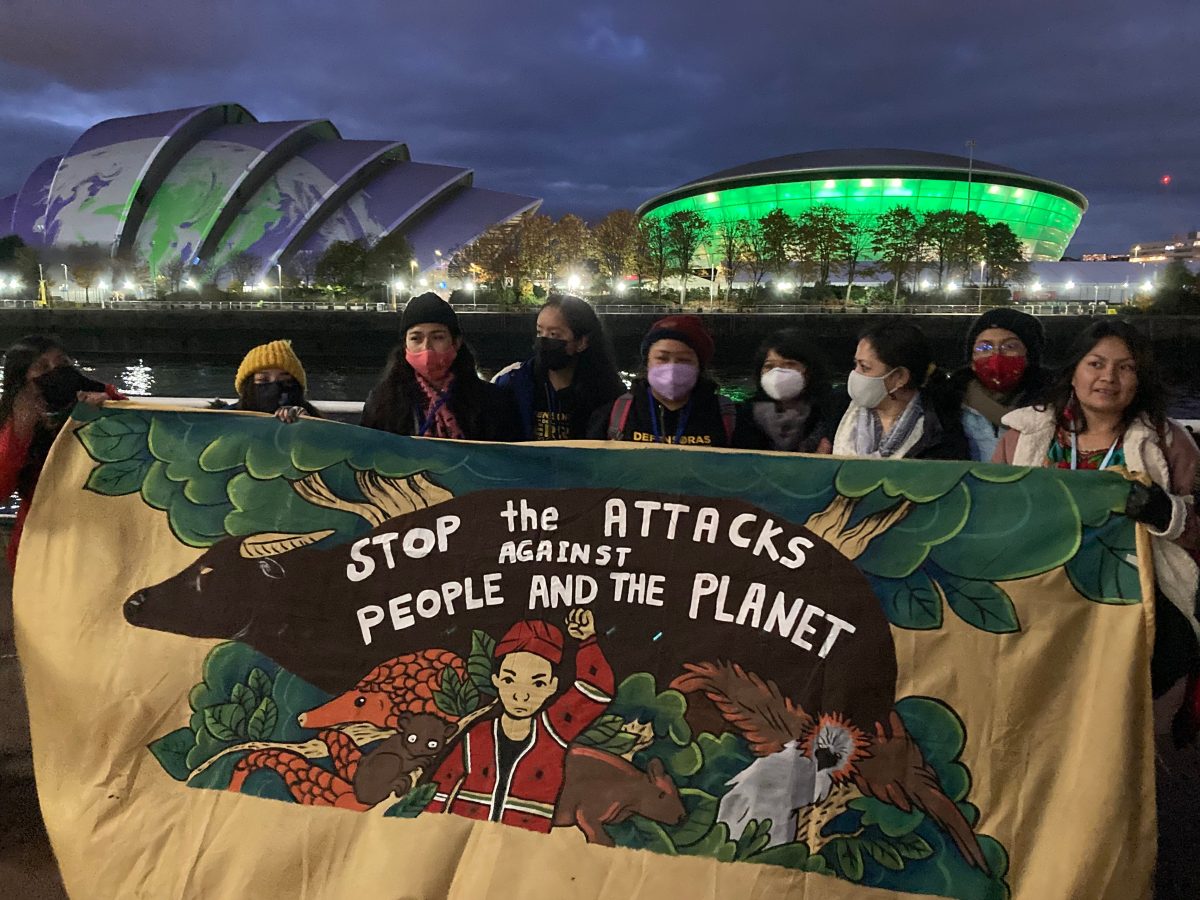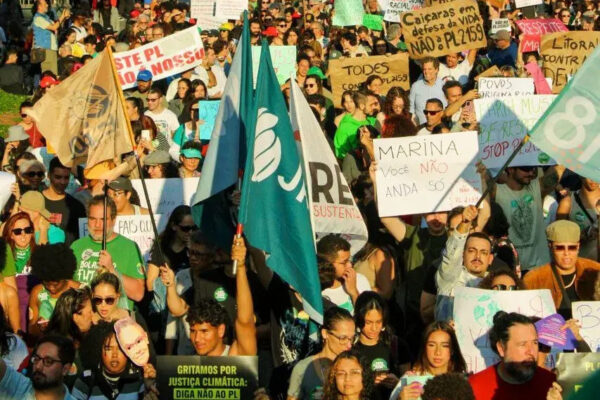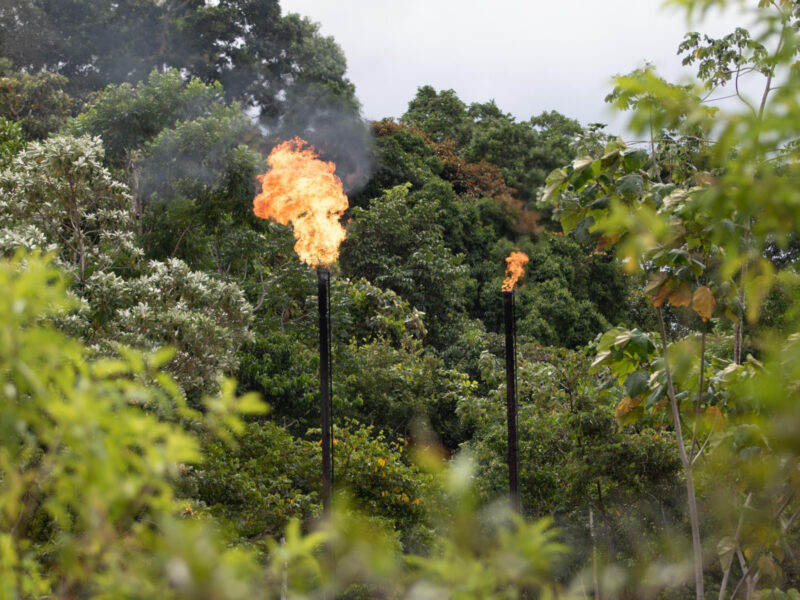Glasgow, UK – Undermining global hopes for meaningful action, the 26th annual Conference of Parties (COP26) climate summit in Glasgow concluded over the weekend without successfully addressing key drivers of the climate crisis, among them the destruction of the Amazon rainforest and the role of fossil fuels. Countries pledged to end deforestation by 2030 and announced $1.7 billion in support to Indigenous forest defenders, without input from Indigenous communities. The commitments are non-binding and fall short of the demands of Indigenous and frontline communities, as well as the urgency and ambition needed to address today’s climate crisis.
During the first week of COP, the Amazonia for Life: Protect 80% by 2025 coalition announced new data on the Amazon degradation and deforestation, which has reached 22%, signaling that the rainforest has reached an irreversible tipping point. Undeterred, Amazonian Indigenous peoples continue to mobilize, calling on governments to act immediately to implement measures to achieve 80% protection.
Rather than taking meaningful action, COP26 provided powerful political and corporate actors the opportunity to cement false solutions like “net zero” targets and carbon trading mechanisms. Eschewing growing calls, from activists to the scientific community, for the rapid phasing out of fossil fuels and moratoriums on further forest felling, it allowed governments to push back zero deforestation targets for another decade. Brazil’s Bolsonaro administration was even congratulated for empty deforestation commitments amid surging Amazon destruction.
Despite being deeply exclusive toward frontline communities, Indigenous peoples, women, and youth attended in full force, organizing for climate justice and against the fossil fuel industry’s corporate greenwash that dominated COP26.
For some Amazonian defenders, traveling to Glasgow was a brief respite from the death threats they face at home. Just days following her return to the Brazilian Amazon, Munduruku leader Alessandra Korap Munduruku’s home was burglarized in a clear attempt to intimidate her and undermine her people’s struggle against illegal mining and government-backed megaprojects. Kakataibo leader Herlín Odicio has gone back to the Peruvian Amazon, where he will likely face ongoing attempts to silence his advocacy for Indigenous rights at the hands of narco-land grabbers.
“Considering the climate emergency, we traveled to COP26 to amplify the urgency of protecting the Amazon, respect for Indigenous rights, lives, and territories, and demand climate justice. Despite the travel restrictions and inequities due to the COVID-19 pandemic, Indigenous representation was substantial both inside and outside the COP, including the largest delegation of Brazilian Indigenous leaders and youth in the history of climate negotiations calling for ‘Land Back’ as a climate solution,” shared Leila Salazar-López, Executive Director of Amazon Watch.
“While Indigenous solutions were clearly present at the COP, the Glasgow agreement failed to address the climate emergency. While nearly $20 billion was pledged to protect forests by 2030, that’s too late for the Amazon, which faces a catastrophic tipping point. We must protect 80% of the rainforest by 2025. This means implementation of the Amazon for Life Declaration, which calls for an immediate moratorium on deforestation and fossil fuel expansion, direct forest finance to Indigenous and forest communities on the front lines of protection, and the exclusion of forest-carbon offsets, ” Salazar-López concluded.
Finance “Greenwashes” Away Role in Climate Chaos
In the world of climate finance, much has been made of the Global Financial Alliance for Net Zero (GFANZ), a group of private sector financiers with assets totaling $130 trillion, signing a commitment at COP26 to achieve net-zero portfolios by 2050.
“This agreement reeks of greenwash: it includes no near-term commitments for any action on fossil fuels or forest protection. In fact, JPMorgan and UBS, both members of the GFANZ, are some of the worst financiers of oil and gas in the Amazon rainforest. It appears that this net-zero pledge is simply another hollow corporate commitment like those that over 700 civil society groups across the world, including Amazon Watch, condemned in the lead-up to COP26,” said Pendle Marshall- Hallmark, Climate Finance Campaigner at Amazon Watch.
The COP also marked long-fought climate victories.
Marshall- Hallmark continued, “Due to years of grassroots movement building, COP26 signaled the decline of the coal age, signaling a clear path for the next targets: oil and gas. We’re building momentum for an Exit of Amazon Oil & Gas by the world’s largest banks through our Amazon Exclusion campaign. In the runup to COP26, Dutch bank ING announced an end to new oil financing in Peru, adding to its earlier commitment to end new oil financing in Ecuador. We’re seeing that with pressure, we can move banks to make the rainforest the next Arctic exclusion.”
Overall, wealthy nations of the Global North yet again failed to take responsibility for their role in driving the climate crisis, as the U.S. and EU banded together to block “loss and damage” financing that would have provided crucial support for Global South nations that are most affected by climate change. As such, COP26’s climate finance outcomes were a continuation of climate colonialism.
Jade Begay, Climate Justice Campaign Director of NDN Collective and Amazon Watch Board Member shares more: “This year, Indigenous Peoples mobilized our efforts to challenge Article 6 in particular because of its severe implications to our land rights. This article promotes carbon market mechanisms that would open up opportunities for land grabs by corporations and governments. We firmly took the position that we would not accept Article 6 unless it includes specific language respecting Indigenous knowledge, proper consultation with Indigenous Peoples throughout the entirety of any decision making processes, and an independent grievance mechanism that holds bad actors accountable.”
Amazonian governments double-speak
Ecuador President Guillermo Lasso received widespread praise for announcing the expansion of a maritime protected area for the Galapagos Islands. But he conveniently failed to mention his government’s plans to double Amazon oil production over the opposition of Indigenous peoples. The decision runs contrary to the recent IEA report indicating the need to keep fossil fuels in the ground and end new financing of new expansion and exploration, which are incompatible with the Paris agreement and the latest IPCC report, as well as COP26’s ambition to limit warming to 1.5C. These projects violate Indigenous rights and are a death sentence for those living in voluntary isolation.
After two weeks in Glasgow, Indigenous Amazonian women defenders from the Kichwa territory of Sarayaku shared, “We Indigenous peoples, resist resource extraction, including fossil fuels, on our lands with our bodies and with our lives. Our contribution to protecting the climate should be recognized and our solutions should be heard. We call upon all governments and the United Nations to recognize our Kawsak Sacha, Living Forest proposal as a solution. Indigenous territories are sources and spaces of life and should be free from all extractive activity to mitigate climate change and ensure human survival. We call on all states, companies, and multilateral organizations to focus on true, not false solutions, and keep fossil fuels in the ground.”
Brazilian climate negotiators attempted to use COP26 to burnish the country’s tattered environment image, announcing a new commitment to achieve zero deforestation and reduce methane emissions by 30% by 2030. Brazil also vowed to end “illegal” deforestation by 2028, two years earlier than a previous target. However, these pledges mean nothing given how deforestation has soared under Bolsonaro to levels last seen in 2008, as the extreme-right populist aims to open the Amazon to industrial development. The preliminary data from the national space research agency INPE showed about 877 square kilometers of forest were cleared in October, a 5% increase from October 2020. It was the worst October deforestation since the current monitoring system began in 2015.
Sonia Guajajara, Executive Coordinator of APIB (Association of Indigenous Peoples of Brazil), stressed the need for Indigenous voices to be central in climate change discussions for real change to occur during a COP 26 special session: “We are not the ones who are creating the pollution, the ones who are making the problem, but we are the people who are being killed by it: this is environmental genocide. Although Indigenous people form only 5 percent of the global population, we protect 80 percent of the Earth’s biodiversity. Yet, we continue to be excluded from decision-making. Governments need to reforest their minds and understand that climate change is already a reality, not a problem for the future. We are here to echo the call of Mother Earth because she is crying, and it is our duty to replicate her call while we still have time. What happens when she stops crying?”
The Peruvian Government maintained its tradition of using the COP to leverage financing. It was one of the countries that signed on to the declaration on forests and land use. Indigenous defenders at the COP reminded international governments that the Peruvian Amazon is facing a humanitarian crisis in which the funds invested to date have not prevented increased violence and deforestation.














